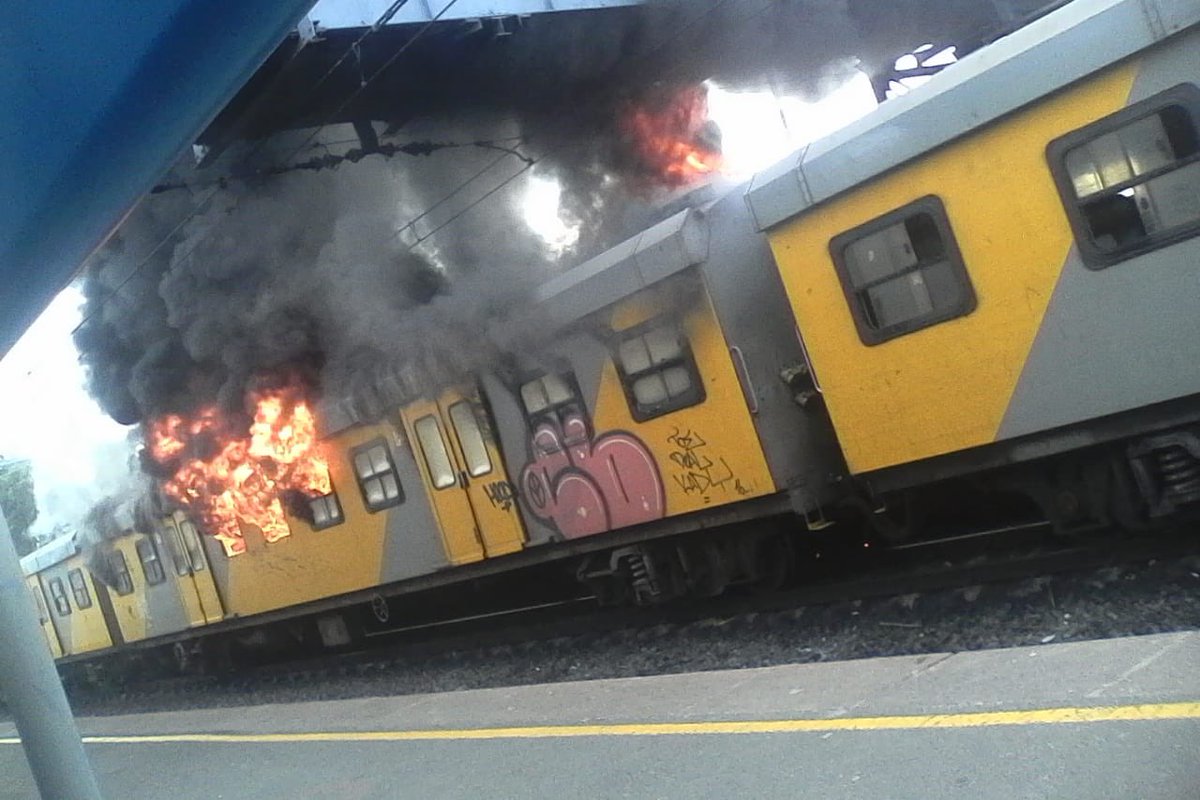Cape Town, the most left-wing of all South African cities where Western-style paintings are often set alight at its university, has another burning problem: over the past year, more than 140 train carriages have been burnt in arson attacks by commuters. After another two carriages were set alight on Saturday, a member of Cape Town’s mayoral committee hinted that the city’s rail system could be “completely destroyed”.
Mr. Brett Herron, the mayoral committee member for transport and urban development, released a statement on Saturday 28 August in which he said: “It is undeniable that a sinister force is at work to completely destroy our rail system. Our commuter rail system is under relentless attack and this is clearly not opportunistic crime but a well orchestrated programme of sabotage.”
In South Africa’s mainstream media, descriptions of arson attacks by Cape Town’s coloured and black gangs are usually depersonified. When a train is set alight by one or several persons, it is usually described as, “a fire broke out” as if it were due to an accident or natural cause.
However, Mr. Brett Heron has stuck to his guns in describing the actions of commuters on the train as “sabotage”.
“The sabotage of our rail system is relentless,” he said. “The city is willing and eager to work with the Department of Transport‚ the Passenger Rail Authority of SA (Prasa) and Metrorail.”
“I have regular engagements with the leadership from Prasa and Metrorail‚ and I am hoping to forge the same working relationship with Minister Nzimande so that we can work together to address these challenges. The urban rail system is the backbone of public transport in Cape Town with thousands of commuters relying on the service. We must step up our efforts to prevent it from further decline.”
According to figures released by the municipality, there were only 8 trains operating on the Central Line instead of the usual 30 trains. The reduction in capacity is entirely due to the arson attacks. According to Heron, the central line had the “highest passenger demand” and was only operating “at a fraction of its capacity”.
Up to 105 commuters, described as “vandals”, have already been arrested for setting trains alight and are “awaiting trial”.
South Africa’s ANC regime has also sent its Transport Minister, communist leader Blade Nzimande, to Cape Town to discuss the recent arson attacks with Prasa (Passenger Rail Authority of South Africa), Herron and Donald Grant, the MEC of the Western Cape for transport and public works.
“We met with SAPS (South African Police Service) who briefed us on their detective efforts and then visited the Salt River Rail Yard where we viewed the shocking extent of the fire damage,” Mr. Brett Heron continued.
He said the matter needed attention, “before the system collapses completely”.
Apparently commuters take the trains but as they arrive at the station, they set the carriages alight “for fun”, according to eyewitnesses FreeWestMedia spoke to.
But Herron believes that his explanation of “sabotage” is more logical, saying: “The alternative is that these are random opportunistic crimes for no purpose. But when you see trains being burnt three or four times a week, every week in the same manner, it suggests to me that there is someone, some organisation or some force that is seeking to destroy our commuter rail system.
“These fires are being set apparently shortly before trains arrive in stations by someone who is on the train. They ignite a fire and exit as the train arrives at the station. It’s just too well-planned, too consistent and too frequent for it to be random.”
Apart from the two carriages that were burnt on Saturday, five carriages and overhead power cables were damaged when a train was torched at Retreat station on Thursday.
Even apart from the two burnt-out carriages from Saturday, the damages for last week amounted to R50 million, according to Mr. Brett Heron. Two commuters also suffered severe burns, with one of them dying as a result.
“The motive and who benefits is the R50m question. Why would there be this campaign to destroy the trains?” Herron asked rhetorically.
The city has budgeted R16 million to recruit a force of hundred extra police officers tasked with guarding trains and commuters against arsonists.
Asked by FWM about the parallels between the vandalism in Cape Town and that encountered in the more multicultural European cities, such as Paris, Strasbourg and other French cities where 1 031 cars were burnt last year, Mr. Brett Herron did not comment, at least not in time for this article.











